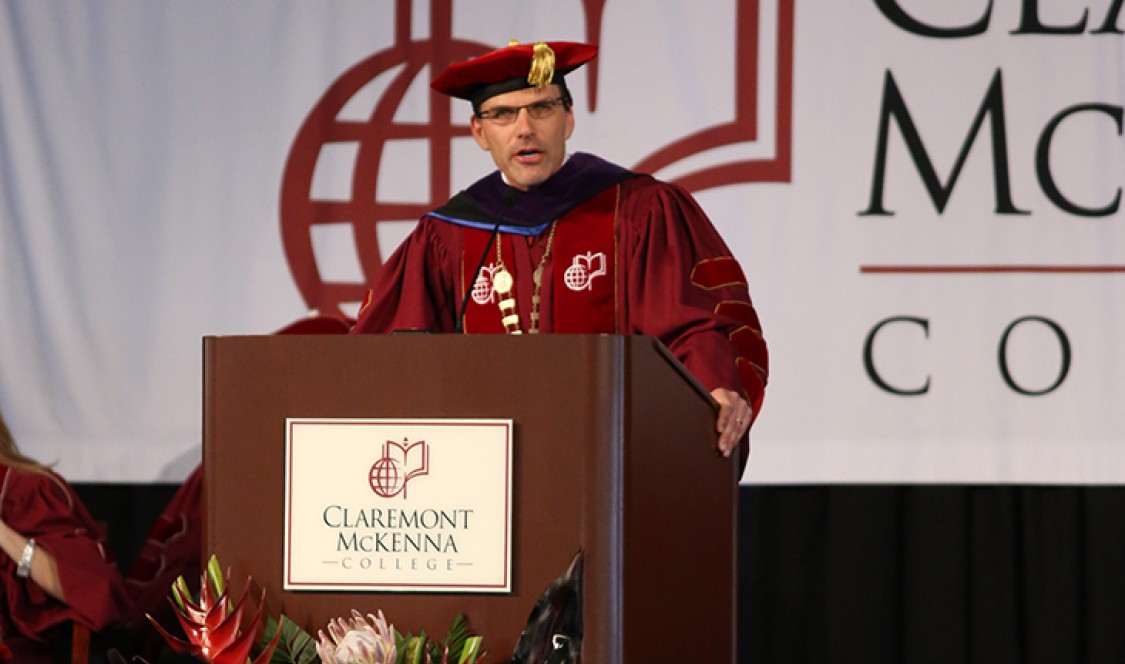Congratulations. You may be seated. Chairman McMahon, Dr. Brainard, Dean Warner, faculty, trustees, alumni, families, friends and especially this outstanding Class of 2014, it is a privilege to stand here before all of you today to look out and see the faces of so many who belong to our CMC family.
Now one of the many conditions of graduation is receiving tons of advice, always wise and sometimes even actionable. From career advice about promising industries—plastics for Dustin Hoffman’s generation of graduates—to motivational salvoes about dreaming big or changing the world.
I know this class well enough to be confident of your capabilities in market analysis and your sense of drive and ambition, so I’d like to focus my charge today on something far more pedestrian: the simple act of doing the small good things for others and doing them with purpose. Much of life is in the details. Forceful thoughts require punctuation. Scaling Everest requires one steady step after another. Powerful strategies depend on momentary actions. Great religions call for daily ritual. Humanity moves through social graces. And yet, details without purpose cramp our minds, pull us down, render life less meaningful. It is details with purpose that become grand. Even if you're not sure how a gesture, question, offer of help fits into the broader picture, if you do small good things for others with a sense of purpose, you will live a more meaningful, profoundly successful, life.
So with these observations in mind, may I now ask our graduates to stand so that you may receive your charge?
Graduates, please stand. Today, we ask that you think how you got here. Your parents and what they did for you, every diaper, every Band-Aid, every mac and cheese, every drive to school, the field, pool or court. Your teachers, every red mark to correct your mistakes, the small encouragements to give you the confidence that you now have. The people like our staff, who worked so hard to help you, cleaning your rooms, preparing your meals, resolving your logistical challenges. These were all each small deeds with a purpose, to grow in you the qualities you have so that you can, in turn, contribute those qualities to others. This means calling your parents frequently. Calling them frequently to see how they are doing. Telling your old professors at CMC what they meant to you. Picking up a piece of trash in the street. Giving directions to someone who appears lost. Apologizing to someone you've upset. Or volunteering to take responsibility for a tough task at home or work. So when you're with another person in a group or an organization, you have one simple question to ask. How can I help you? How can I contribute? How can I add value? No matter how small the deed or task, if you do this and do it with purpose to serve others, you will do great things for yourself and you will lift those around you as a result.
In the grander scheme, the only answer to the banality of evil is the banality of good, and we create good by doing generous, small things for others. Now here’s the easy part for you; you already know it. I observe it every day in the way you engage, ask questions, pull others out into our community, grow these great institutions that you've grown, solve tough problems through your research and seek to really make a difference. That’s the CMC way. And my modest charge is today: take it with you. Don’t leave it on the stage today. Make it your signature. And you will lead yourselves, as Jack says, and you will lead by example, as Tamar and Bart did, by doing the small good things for others, gifting your value, making your contributions, sharing your best ideas with others are your commercio.
Helping others, building your new community and leading by example are your civitas. That’s your charge. That’s your story. That’s the story of Claremont McKenna College.
Thank you for your support this year and beyond, and many, many congratulations to each of you.

